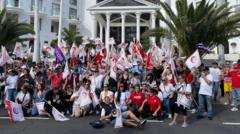Travelers looking forward to their Easter weekend in Tenerife may be faced with unexpected disruptions as hotel workers have announced strikes on Thursday and Friday. The protests come as part of ongoing disputes over pay and working conditions for the island’s hospitality staff. Despite a breakthrough agreement for workers in Gran Canaria, Lanzarote, and Fuerteventura, around 80,000 employees in Tenerife, La Palma, La Gomera, and El Hierro are still set to participate in the industrial action.
The UK Foreign Office has issued warnings to travelers, advising them to stay updated with their tour operators and to heed local authorities' recommendations. Legally, strikers are required to maintain a "minimum service," however, the Comisiones Obreras union, which organizes the protests, argues that essential services like cleaning and food preparation should not be included in this category. They contend that enforcing such measures undermines the workers’ right to strike and represents an unfair restriction on their fundamental rights.
Fernando Cambon Solino, one of the protesters, expressed the stark contrast between the idyllic image of the Canary Islands and the harsh realities faced by workers. Highlighting the significant challenges, fellow protestor Rodrigo Padilla shared the difficulties his mother faces as a waitress, noting her exhausting commutes and demanding schedules.
The wave of strikes is seen as part of a broader response to rising concerns regarding the tourism industry’s impact on local living conditions. Residents have voiced their frustrations as they grapple with increasing housing costs attributed to mass tourism. While locals acknowledge the significant role of tourism—accounting for 35% of the Canaries' economy—they advocate for a more sustainable approach that takes environmental impacts and housing pressures into account, ensuring that local needs are prioritized alongside the influx of tourists.
The UK Foreign Office has issued warnings to travelers, advising them to stay updated with their tour operators and to heed local authorities' recommendations. Legally, strikers are required to maintain a "minimum service," however, the Comisiones Obreras union, which organizes the protests, argues that essential services like cleaning and food preparation should not be included in this category. They contend that enforcing such measures undermines the workers’ right to strike and represents an unfair restriction on their fundamental rights.
Fernando Cambon Solino, one of the protesters, expressed the stark contrast between the idyllic image of the Canary Islands and the harsh realities faced by workers. Highlighting the significant challenges, fellow protestor Rodrigo Padilla shared the difficulties his mother faces as a waitress, noting her exhausting commutes and demanding schedules.
The wave of strikes is seen as part of a broader response to rising concerns regarding the tourism industry’s impact on local living conditions. Residents have voiced their frustrations as they grapple with increasing housing costs attributed to mass tourism. While locals acknowledge the significant role of tourism—accounting for 35% of the Canaries' economy—they advocate for a more sustainable approach that takes environmental impacts and housing pressures into account, ensuring that local needs are prioritized alongside the influx of tourists.



















